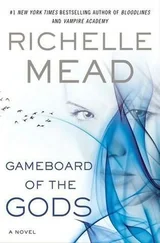The machine bleeped again. Ginty rolled the remains of the basil leaves into a ball and dropped it in the bin, before stopping the messages and pressing the key for her parents’ phone number.
Waiting for the automatic dialling process to click through, she wondered how her mother would explain Rano. His justification of what he was doing still made Ginty feel sick. As an evolutionary psychologist, Doctor Louise Schell could take the heat out of the fieriest emotion and rationalize almost any human behaviour in terms of its survival value. Ginty hoped that organized rape would be too much even for her.
Her new housekeeper, Mrs Blain, answered the phone with the familiar announcement that both Ginty’s parents were at work and could not be disturbed. Trying to feel as cool and untouchable as they, Ginty left a message to say that she’d do her best to track down some Fru-Grains and that she expected to arrive at about eleven-thirty on Saturday.
The only other call she had to answer straight away was from Maisie Antony, the editor of Femina , who had sent her out to the refugee camps in the first place.
‘Ginty, it’s Maisie here,’ said her message. ‘Let me know as soon as you get in. The stories on the news have been ghastly, and I need to know you’re all right. Then we have to work out how you’re going to write the piece. OK? Ring me.’
Ginty rang, touched that Maisie cared enough to be so worried about her, and glad of the welcome, too. But she was in a meeting, so all Ginty got was her secretary and an appointment for Monday afternoon.
The last message came in a highly civilized voice, announcing that its owner was a friend of Ronald Lackton, who’d asked him to ring and offer his services in case she needed anything. He gave his name as Jeremy Hangdale, left a phone number, and said he’d be only too happy to help Ms Schell with any information she might want.
‘We have many friends still in London,’ Rano had told her, but she hadn’t expected them to get to her so fast. Funny how that one call could make her feel so exposed. Fresh air suddenly seemed less important than security, so she locked the french windows again.
Unzipping her bags where they were, she carried piles of dirty clothes straight across to the kitchen to load into the washing machine. When she slid a hand inside the insulation around the water cylinder, she was relieved to feel warmth against her palm. But it wasn’t hot enough for a bath yet, so she made a mug of strong tea, turned on her laptop, plugged in the modem and started to read her e-mails. The snail mail could wait till later.
An hour later, she was standing under the shower, letting the water drum down on her head and sluice over her body. Only when she felt properly clean again did she run a bath. She added lavender oil for serenity and rosemary for strength, without believing in either, lit a couple of orange-scented candles and put some Mozart on the CD player.
‘Always play Mozart, Ginty,’ her father had told her years earlier, ‘when you are feeling low or anxious. Your mood will lift.’
Much later, sitting clenched in front of her laptop, she read through the stiffly formal first draft of her interview with Rano and wrinkled her nose in self-disgust. The three thousand words seemed nearly as constipated as the first book review she’d written. That had taken days and been quite unpublishable. She should have known better by now, but she couldn’t see how to bring this piece to life.
Listening to the interview tape again might help. She rewound it and played it once more. The firmness of her own voice amazed her. No stranger hearing it would have guessed she was a scared amateur, who had to stretch to reach five-foot-three on any measuring stick. But when the tape spooled on to the moment when Rano had insisted that she admit his actions had been justified, she stopped it and decided she needed coffee.
Caffeine couldn’t give her courage, but boiling the kettle provided an excuse to leave her work for a few minutes. When she’d drunk half a mugful, she laid her fingers on the keyboard again, forced herself to remember what it had been like in the farmhouse, and had another crack at recreating Rano and his aura for the comfortable, highbrow, mainly middle-aged readers of the Sentinel .
She wished she could describe the blood under his nails, and the tortured man who’d been dragged away as she arrived, but those must have been exactly the kind of things he’d been warning her about. Maisie had once told her that until she risked getting off the fence and writing what she really believed, her work would always be bland and she’d never get anywhere, but this was different.
She’d just about got to the stage where she could face her mother’s distaste for what she wrote, but the possibility that Rano might send someone round to ‘remind’ her of what he wanted her to write was something else.
‘But would he?’ she asked aloud, hearing her father’s voice in her head as he warned her of the dangers of melodramatic fantasy. She told herself that she’d watched too many James Bond films. No one was going to come crashing through her french windows to beat her up, or fling her into a pool of piranhas. This was London at the end of the twentieth century, and she was – or wanted to be – a serious journalist. She had to take risks.
The first paragraph was too sycophantic even for her. She rewrote it, then deleted the angry new version without even re-reading it. When the phone began to ring she ignored it. The machine could deal with whoever wanted her. This piece had to go to Harbinger in twenty-four hours, whatever state it was in, so she couldn’t slack off now.
Harbinger put Sally Grayling’s faxed outline in his pending tray. It was dire. Nothing about it suggested that she had any talent whatsoever. There wasn’t even a hint of rhythm in her clunky sentences, and she had no idea of basic grammar; even the proper use of the apostrophe was a mystery to her. Worse than that, her banal ideas bored the pants off him. He pushed back his chair until the back of his head nearly touched the late 18th-century bureau bookcase behind him. He still took pleasure in this converted Soho house, with its perfect proportions and panelling, and the glorious furniture the Sentinel’s original owners had provided for their editor. He might be paid only a fraction of what he’d have got as editor of The Times , but at least he didn’t have to work in poxy Wapping and he was surrounded by pieces that would have graced most museums.
Were the likely benefits of pulling Sally Grayling worth a crash course in basic journalism? Basic English even? Bellowing for a cup of tea, he decided to think about it later and do some real work before the end of the day. The week’s copy deadline was still two days away, so all the pros were hanging on to their stuff. But Ginty Schell had sent hers through.
His assistant brought in the tea, strong and dark orange as he liked it.
‘You OK, John?’
‘Why?’
‘You look as if you’ve seen a ghost.’
‘Worse than usual?’ He held back his usual lecture on the deadening effect of cliché.
‘Much.’
He grunted. ‘Nothing tea won’t cure. Bugger off now, will you? I’ve got work to do.’
‘OK.’
He waited, finger on the mouse, until she had gone, then he let Ginty Schell’s formally arranged e-mail reveal itself on the screen again.
Dear John,
Here, cut and pasted into the e-mail as you asked, is my piece on Rano. He was quite firm about what he wanted me to include, but it seems important to offer something of the opposite point of view, too. Anyway, I hope I haven’t made it too even-handed, too bland. Let me know what you think,
Читать дальше












